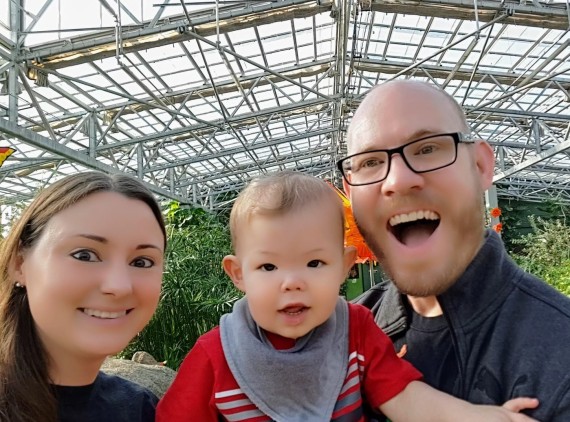Three years ago, Jessica experienced a healthy first pregnancy and healthy delivery. She and her husband were thrilled to welcome their first child, a boy named Jackson.
A few months after Jackson was born, Jessica’s maternal instinct told her that something was off.
“Even as a baby, something just didn’t feel right,” Jessica says. “There were so many odd things going on, but there were no definitive answers. It’s hard to explain the symptoms without seeing him in person.”
Gastrointestinal issues were downplayed by Jackson’s pediatrician at the time. Eventually, his symptoms grew to include fainting spells. Jackson also wasn’t meeting milestones that other babies his age were meeting.
“Other kids his age were becoming little people, and he was just becoming a bigger baby,” Jessica recalls.
Jackson visited a few specialists, who unfortunately couldn’t provide the answers Jackson’s family desperately sought. Some people told Jessica it might be autism, but she knew that wasn’t it, either. Eventually, Jackson saw a cardiologist who told Jessica that her son needed care from Phoenix Children’s.
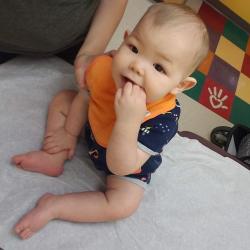
Jackson was referred to Dr. Brian Appavu, a pediatric neurologist at Barrow Neurological Institute at Phoenix Children’s. After a thorough exam, medical history and testing, Dr. Appavu offered Jackson’s family a diagnosis – MECP2 Duplication Syndrome. Also known as MECP2 DS, this neurodevelopmental disorder is more common in boys than girls, and characterized by low muscle tone, plus delays in mental, speech and motor development. Many children with MECP2 DS have recurrent lung infections and/or seizures. Children with MECP2 DS are more likely to be diagnosed with autism than a typical child. Stomach issues are common as well.
Although Jessica was “shocked” to get Jackson’s diagnosis since they had no family history, “On one hand, the diagnosis explained everything,” she says.
The family recognized their son would have a different life than the one they had imagined.
“When we got Jackson’s diagnosis, the future we had planned for our son was gone,” Jessica recalls.
Finally receiving a diagnosis felt like a path forward. Jackson’s family was now supported by a team of doctors and therapies.
“Without Dr. Appavu, Jackson wouldn’t have a diagnosis yet,” Jessica says.
A big team, working as one
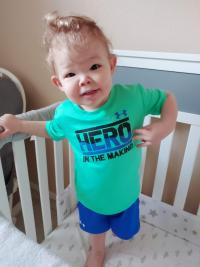
Jackson’s care team at Phoenix Children’s is vast. It includes neurology, gastroenterology, allergy and immunology, ophthalmology, audiology and genetics.
These days, they most frequently see Dr. Theresa Grebe, a pediatric geneticist with Phoenix Children’s Genetics & Metabolism Department.
His frequent appointments have continued during the COVID-19 pandemic, thanks to telehealth.
“Telehealth has been amazing for our family,” Jessica says. “It’s easier to attend a virtual appointment from the safety and comfort of home, compared to packing up the car with everything Jackson needs in order to leave the house.”
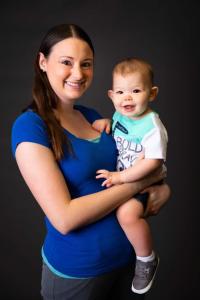
Although Jackson’s care team has a lot of moving parts, his mom says everything moves as one.
“Everything about Jackson’s care works together. His doctors work together and contact each other, so I don’t have to do any of that,” Jessica says. “I can go to one specialist and they already know what happened at our last appointment with another specialty.”
Throughout the pandemic, Jessica noticed that Phoenix Children’s physicians made an effort to proactively check in with Jackson.
“When the shutdown started last year, doctors reached out to us to say be careful,” she recalls. “They knew that with his condition, he was at higher risk.”
Jessica and her husband are integral parts of Jackson’s care team. Being an active part of decisions surrounding her son’s care makes Jessica feel seen and heard.
“I’ll often tell his doctors, ‘These are my thoughts. I would like to try X or Y,’ and they will always listen to me and hear my ideas,” she says. “We come up with plans together.”
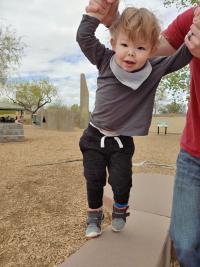
Jackson today
Jackson, now a bright-eyed 3-year-old boy, loves problem solving, and is “a super curious and inquisitive kid,” his mom says. He celebrated his birthday in March with a Blues Clues theme, his favorite character.
It’s easy for everyone Jackson meets to fall in love with him, Jessica says, thanks to his cheerful, happy demeanor. And although Jackson is nonverbal, his mom notices typical “toddler-isms” as his personality continues to develop.
From one mom to another
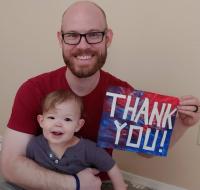
Having a child with MECP2 DS changed Jessica’s perspective on what parenthood would be. With Jackson’s condition, everything is one day at a time, Jessica says. Their family has learned to celebrate something every day.
“Some parents take things for granted or might not notice little things their kids do,” Jessica says. “We have learned to notice and celebrate him doing silly, little, subtle things like kicking a ball. That is a party for us.”
Jessica also recommends that other parents be cautious of where they get medical information.
“Immediately after Jackson’s diagnosis, I went to Google, and everything I found was worst-case scenario,” Jessica says. “I found it much more helpful to connect with individual families who are also living with this condition. Finding other families who have been on this journey for longer has given me hope.”
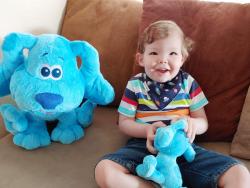
Part of this work has included joining forces with the MECP2 Duplication Foundation in an effort to raise awareness about the condition, which is often misdiagnosed.
Another lesson Jessica shares with other parents is the reminder that they know their child best.
“Don’t let anyone tell you what your child is capable of, let your child show you what they are capable of,” she says. “There were so many times that we didn’t think that he would do something and then he would surprise us and do it.”

